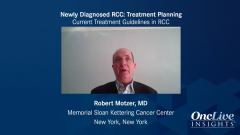
Supportive Care for mRCC: Current Practices
Drs Robert Alter and Robert Motzer discuss the rationale and use of surgery as supportive care to treat appropriate patients with metastatic renal cell carcinoma.
Episodes in this series

Robert Motzer, MD: Surgery has been the cornerstone of management for kidney cancer. Surgery largely has a role in that it is utilized for either nephrectomy or a partial nephrectomy for localized kidney tumors. Those are the curative treatments for a localized kidney tumor. For people who have metastasis, cytoreductive nephrectomy has been utilized widely to remove the kidney primary before starting systemic therapy. There was a large, randomized trial, called CARMENA, that randomized patients to a cytoreductive nephrectomy followed by sunitinib versus sunitinib alone. It was a noninferiority trial. It showed that the survival was the same for patients regardless of whether they had the cytoreductive nephrectomy.
Now this conflicted with 2 older trials in the interferon era that showed that patients lived longer if they had had a cytoreductive nephrectomy in the setting of interferon. It has caused us to pause and reevaluate the role of a cytoreductive nephrectomy. It is clear that patient selection is key in choosing cytoreductive nephrectomy. Patients with poor risk tumors, comorbid conditions, wide-spread metastasis in the bone, and those who are symptomatic are likely not good candidates for cytoreductive nephrectomy, based on the CARMENA trial. For patients with large kidney tumor primaries, particularly if they have symptoms with hematuria and a very small metastatic burden, like nodules in lungs, should still undergo a cytoreductive nephrectomy.
Surgery also plays a role in managing metastasis. If there’s a solitary metastasis, and it can be removed without excessive morbidity, then the metastasectomy is still one of our key tools in the treatment of metastatic renal cell cancer. An example of that would be a patient who has a nephrectomy and then 2 or 3 years later develops a growing lung nodule. In that case, resectioning of that lung nodule is important for diagnosis and management. Also, orthopedic surgery is used for patients who have pathologic fractures or who progress in areas such as the bone or spine, despite radiation therapy. Then surgery is utilized for those patients as well.
Robert Alter, MD: When considering how we can improve outcomes in surgical patients, we have to have a good rapport with our urologist. The conversation in the past was always about cytoreductive nephrectomies followed by systemic therapies. The clinical trials revealed a possible benefit to single-agent tyrosine kinase inhibitor therapies as well as the potential benefit of utilizing immunotherapies as a neoadjuvant therapy to allow the patient to have a resectable disease. Thus, we have to approach the situation, when it comes to surgery, making sure that we realize that surgery can be a necessity prior to initiation of systemic therapy.
That may be based upon symptoms, including hematuria, pain, and vascular compromise when it comes to tumor thrombus. The usage of a multidisciplinary care team is of significant importance. At the same time, there is still conversation regarding the possibility that we can reduce the tumor burden in patients and have the patient undergo nephrectomy, but suddenly conclude that the patient may not need to be initiated on systemic therapy so fast.
Clinicians should be cautious with surgery, specifically in regard to the location of the tumors. Right-sided tumors mean potential liver involvement. Left-sided tumors can involve the celiac or the superior mesentery vasculature, bulky retroperitoneal disease, poor functional performance status, comorbid conditions. All these things should be taken into account prior to and after surgery. An improved surgical outcome would be quite important to our patients, again thinking about it in a sequencing fashion.
Transcript edited for clarity.


















































